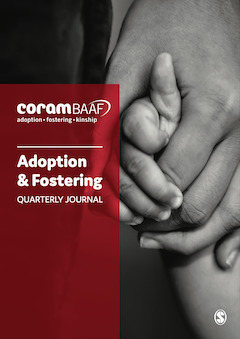
A call for papers: ‘Adoption & Fostering’ Special Issue
The Adoption of Children Act 1926 introduced for the first time in England and Wales a legal process by which the rights and responsibilities for a child could be transferred from birth parents to adoptive parents. It gave adoptive parents the same rights and responsibilities as birth parents and secured the child’s new position within their adoptive family. At the time, the majority of adoptees were ‘illegitimate’ children whose birth families were unable or unwilling to support them. One of the key purposes of the Act was to protect all concerned from the stigma of illegitimacy. Adoptions were shrouded in secrecy and contact between children and birth family members was curtailed.
In 2026 it will be 100 years since the Adoption of Children Act 1926 was first introduced. Although the legislation still stands, there have been numerous changes during this period. Contraception, abortion, reduced stigmatisation, and better support and employment opportunities for single mothers have all meant that the population of children placed for adoption has now changed. Nowadays, the majority of those who are adopted in the UK are children who have been placed in local authority care because the courts have found them to be ‘suffering, or likely to suffer significant harm’, and who cannot safely return home within an appropriate timeframe.
Much more is known about the consequences of adoption – for all three parties: birth parents, children and adoptive parents. And for adoptees we know much more about the (long-term) consequences of abuse and neglect, and of transferring a child from one family to another – the development of complex identities; the consequences of secrecy; the importance of contact; the need for post-adoption support.
Adoption & Fostering is inviting contributions for a Special Issue to reflect on the first hundred years of legal adoption in England and Wales. Authors of papers published in the Special Issue will also be offered the opportunity to discuss their article as part of the journal’s podcast series (30–45 minutes) published under the CoramBAAF Conversations umbrella.
Papers that explore any issues concerning adoption in the UK within the context of change over time will be considered for publication. We particularly invite contributions covering:
- Research questions on adoption since 1926. Progress made and continuing gaps in knowledge
- Cohort studies and what they tell us about adoption outcomes over time
- Changing experiences of birth parents
- Post-adoption contact with birth families – current developments and implications for the future
- Access to records – the pros and cons of accessing records, including practical and psychological obstacles
- Comparative studies – how has the evolution of adoption in the UK differed from that in other countries?
- Post-adoption support – for adoptees, birth parents and/or adoptive parents: what have we learned, and what do we need to know?
- The voice of adoptees (i.e., co-produced studies, topics such as intersectionality or identity)
Please submit abstracts (up to 200 words) for proposed articles to Victoria Walker (victoria.walker@corambaaf.org.uk) by 18 April 2025. Completed papers (5–7,000 words) will be due by 1 October 2025.
